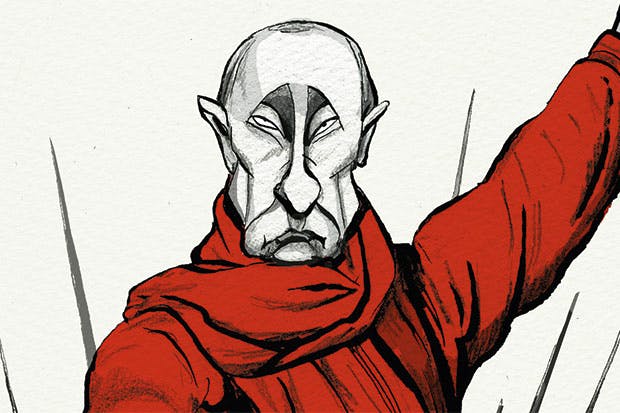What was Vladimir Putin playing at? Earlier this month, he sent Ruslan Boshirov and Alexander Petrov on to state television to say they were not spies at all, just tourists who had travelled 3,000 miles to see Salisbury Cathedral while staying in the wrong city. Exposing them in this way would mean it would only be a matter of time before it emerged that Boshirov was, in fact, not who he claimed he was. Unsurprisingly, Boshirov is actually Anatoliy Chepiga: not a sports nutritionist but a decorated GRU Colonel. He was awarded Hero of the Russian Federation, Russia’s highest state award, which was most likely handed to him by Putin himself. A Brit might be thinking: Ha! Gotcha! Putin has been caught in the act.
But perhaps this is Putin’s point: that he wants to show the world he can take out enemies of the Kremlin anywhere he likes, and doesn’t even have to cover his tracks. That he can send serving GRU officers to walk past every camera in Waterloo and still get away with it by denying it. That he can, in other words, troll the British. And the world.
As Rodric Braithwaite argues in this week’s Spectator, humour can become a dangerous weapon of diplomacy and propaganda. It strips your enemy of its prestige and claims to justice. In The Joke, Milan Kundera writes that “No great movement designed to change the world can bear to be laughed at or belittled. Mockery is a rust that corrodes all it touches.” Russia is proud to be the leading experts at the diplomatic weaponisation of humour – one needs only to look at the Russian Embassy in London’s Twitter feed to see how it daily mocks British politics and media.
The Russian press is already working hard to debunk the Bellingcat investigation. One popular tabloid has even provided its own three proofs for why it is wrong. Firstly, according to the Bellingcat story, Boshirov would have spent four years at the Military Command Academy, but training at that time was actually five years. Russia changed it to four years in 2016, which they would have easily found on open source, the article claimed. Secondly, the training he undertook was for motorised rifle divisions and the marines, which means that, yes, in theory, he could go into intelligence, but, in practice: no. Bellingcat also stated that in 2003, Boshirov was with GRU’s 14th Brigade in Khabarovsk; however, the authors of the debunking article claim that at that time the unit was actually in Ussuriysk, 670 kilometres from Khabarovsk.
Last week, the Russian company Golden Brand registered ‘Petroff and Boshiroff’ as a brand in Russia under a classification which allows the brand to, among other things, be used for the sale of perfumes, the opening of fitness clubs and the provision of tourist services. This will be quite funny to anyone who watched last week’s RT interview with Petrov and Boshirov/Chepiga.
That interview where the pair promised they were just normal, Russian men who had gone to visit Salisbury because their friends had long been recommending they go was, of course, ridiculed by the British press. Surely the pair could have come up with better lies? Two Russians hindered by some snow? At the very least, though, it was clear that they were Russians; after all, no Brit would have relied on trains to run on time, especially not on a Sunday.
But who came up with the idea that Boshirov and Petrov should do an interview in the first place? And who scripted their terrible answers? Who on earth would watch it and think “yeah, innocent tourists, those two”. No one, which is the point. What the interview and their lousy, see-through explanations clearly show is that the Kremlin simply doesn’t care if people believe they actually are sports nutritionists or not. The interview was made to mock the British investigation. Laughing at someone disarms them. It dismisses them.
But who’s laughing now? The mockery of the Russian spin on things sure seems ridiculous – ‘the one who laughs the best is the one who laughs the last’ as a Swedish saying goes. The Bellingcat investigation removed any remaining doubt that the two would actually be anything other than GRU spies. No wonder the RT’s editor assured her Twitter followers today that there would be enough t-shirts for everyone – not as funny now are they?
Something tells me, though, that Putin will have the last laugh anyway. Just as the interview was designed to mock, it remains the case that Putin blatantly disregards international law and British lives. As we’ve seen, the Russian press is already using its creative writing to deflate the Bellingcat investigation. “Even Orwell never dreamed of this stuff,” said Echo Moskvy’s columnist Karina Orlova in a Facebook post on Russian mockery, comparing modern-day Russia to “a monkey holding a grenade.”
That is exactly how the world sees Russia, she said: “it’s funny, but it’s also dangerous.” The RT interview is the perfect example of that. Today’s propaganda, as opposed to during Soviet times, is not pretending that its claims are true or need evidence, but attempts to obfuscate, confuse and befuddle through mockery and ridicule. And I think it’s working.






Comments